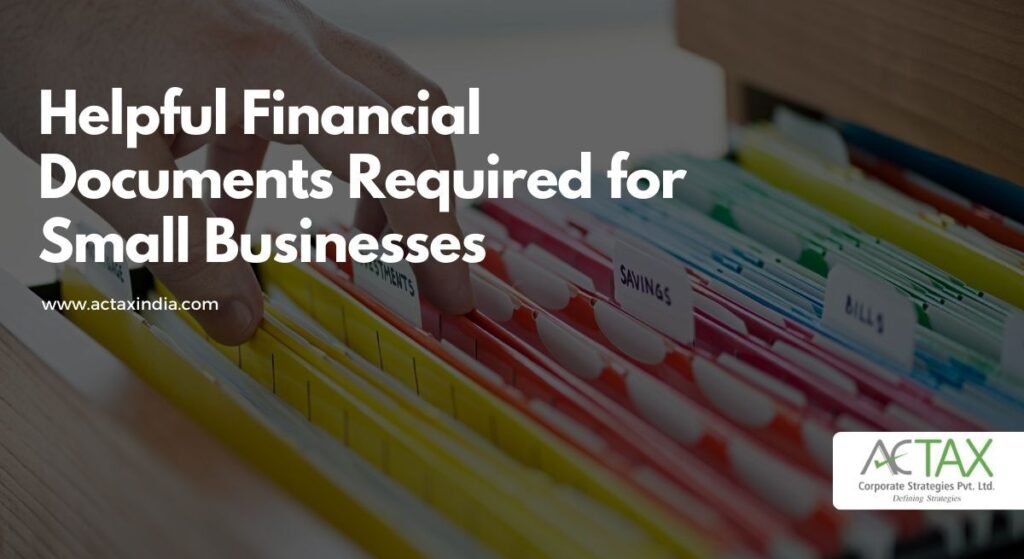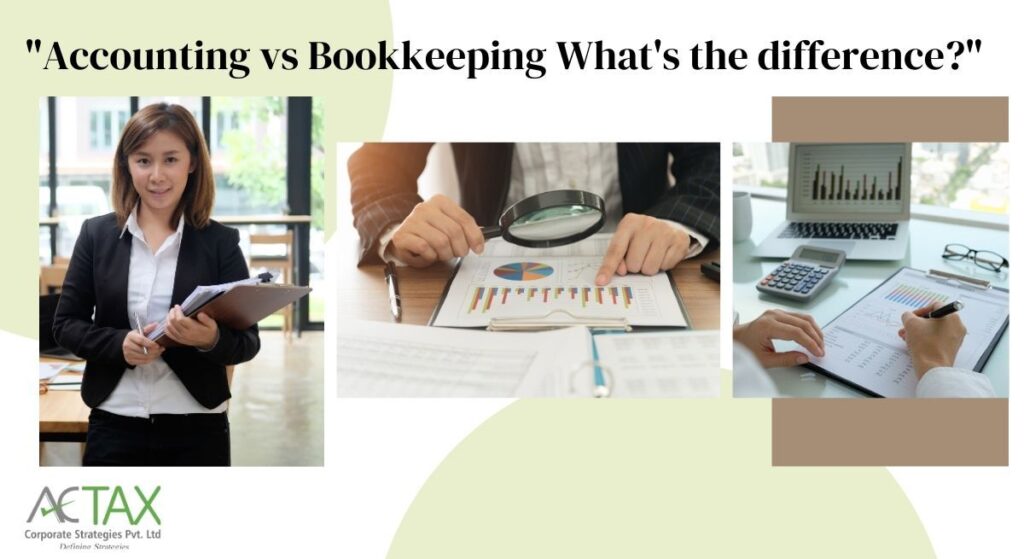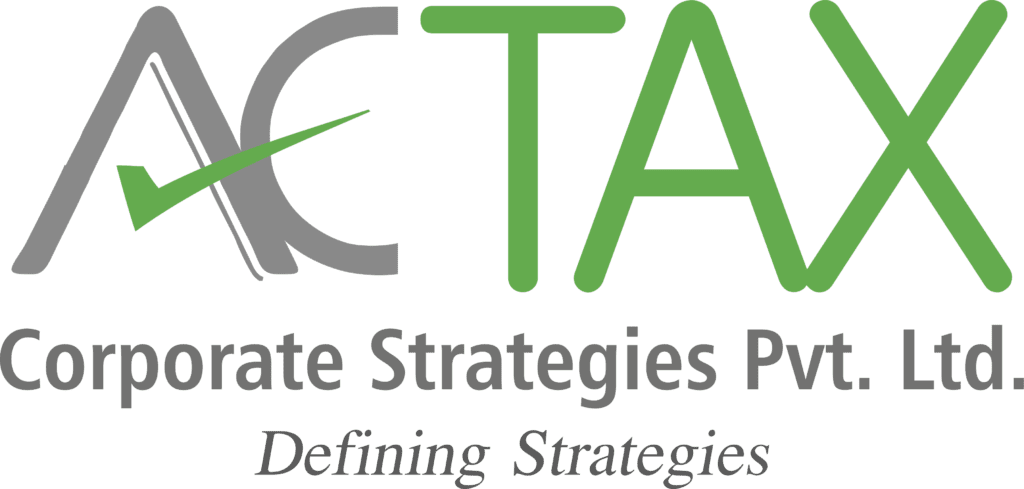Financial documents for small businesses are the compass that guides decision-making, fosters growth and ensures financial health. These documents are not mere pieces of paper; they are the lifeblood of a small business’s financial stability and success.
Table of Contents
What Is Financial Documents For Small Businesses?
Financial documents provide a detailed account of an organization’s financial transactions and status. Financial documents for small businesses include balance sheets, income statements, cash flow statements, and financial reports. They offer insights into a company’s financial health, performance, and stability. Financial documents are crucial for internal and external stakeholders, such as investors, creditors, regulators, and management, to assess a company’s fiscal position, make informed decisions, and ensure compliance with accounting standards and tax regulations. These documents are the foundation for financial analysis, budgeting, forecasting, and strategic planning in businesses of all sizes.
4 Helpful Financial Documents For Small Businesses
1. Income Statement, a major financial documents for Small Businesses
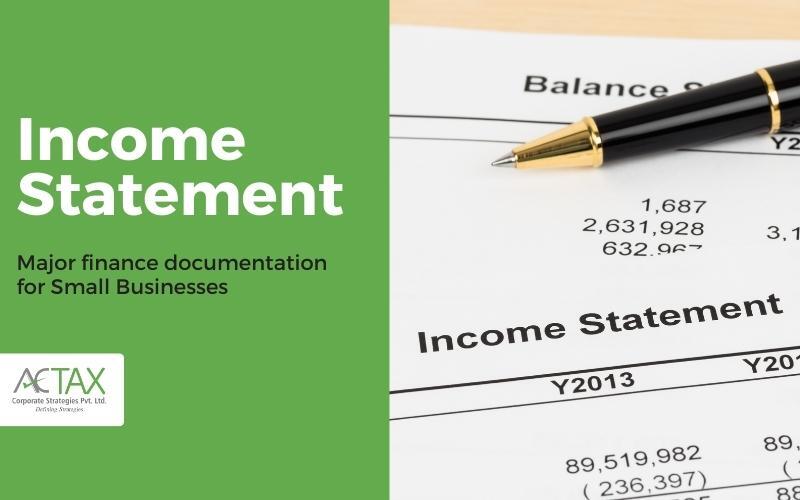
The income statement, or the profit and loss statement (P&L), is a vital financial document for small businesses. It provides a comprehensive overview of a company’s financial performance over a specific period, typically a month, quarter, or year. Here’s why it’s a helpful tool for small businesses:
Revenue Tracking Of Financial Documents For Small Businesses
The income statement begins with a record of the company’s total revenues, including sales, services rendered, and other income sources. For small businesses, tracking revenue is critical for assessing growth and identifying areas of opportunity.
Cost Analysis
After revenue, the income statement deducts various costs, including the cost of goods sold (COGS), operating expenses, and interest expenses. This section helps small business owners understand their cost structures and identify areas where cost-saving measures can be implemented.
Profitability Assessment
The income statement’s bottom line shows the net income or profit of the business. Small business owners can gauge their profitability and assess whether they generate enough revenue to cover expenses and yield a profit.
Financial Health
By examining the net income figure over different reporting periods, small business owners can assess their company’s financial health and whether it is improving or deteriorating. This information is crucial for making informed decisions about investments and expansion.
Budgeting and Forecasting
The income statement is a basis for budgeting and forecasting future financial performance. Small businesses can use historical income statements to set realistic financial goals and create strategies for growth.
2. Cash Flow Statement For Small Businesses
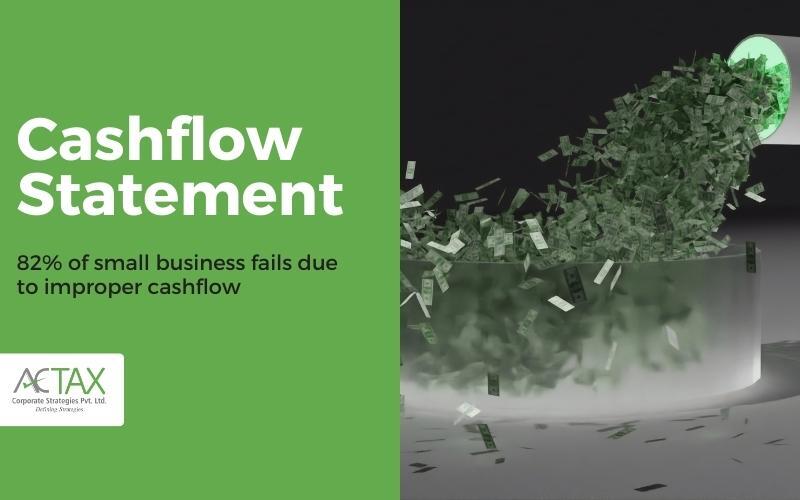
Did you know that 82% of small business failures are due to cash flow problems? Regularly reviewing your cash flow statement goes a long way in keeping your business on the positive side of that statistic.
The cash flow statement is an essential financial documents for small businesses, offering valuable insights into the cash movement within the company. It provides a detailed breakdown of how money is generated and used during a specific period, typically a month, quarter, or year. Here’s why it’s a helpful tool for small businesses:
Liquidity Assessment
The cash flow statement helps small business owners assess their liquidity, indicating whether they have enough cash to cover daily operations, pay bills, and seize opportunities. It distinguishes cash flow from operating, investing, and financing activities, offering a comprehensive view of cash availability.
Budgeting And Forecasting
Small businesses rely on cash flow statements to create budgets and forecasts. By analyzing historical cash flow data, owners can project future cash needs and set realistic financial goals. This planning ensures the company can meet financial obligations and invest in growth.
Expense Management
Understanding cash flow patterns allows small business owners to manage expenses more efficiently. By identifying periods of cash surplus or deficit, they can adjust spending and prioritize essential expenditures, optimizing financial stability.
Investment Decisions
The cash flow statement guides small business owners in making investment decisions. It helps assess the feasibility of capital expenditures, such as purchasing equipment or expanding facilities, by analyzing their impact on cash flow.
Creditworthiness
Lenders and creditors often request cash flow statements when evaluating a small business’s creditworthiness. A positive cash flow statement demonstrates the ability to generate sufficient cash to repay loans or meet credit terms, improving the likelihood of obtaining financing.
3. Balance Sheet For Small Business
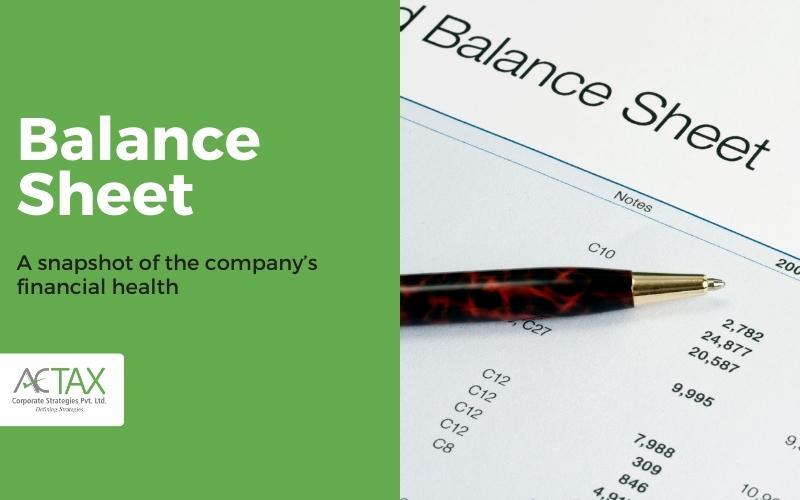
The balance sheet is a fundamental financial documents for small businesses, providing a snapshot of the company’s financial health at a specific time. It consists of two main sections: assets and liabilities, with the difference between them representing equity. Here’s why the balance sheet is a valuable tool for small businesses:
Financial Documents Of A Company Snapshot
The balance sheet concisely summarizes a small business’s financial position. It details what the company owns (assets) and what it owes (liabilities) at a specific date, helping owners understand their financial standing.
Liquidity Assessment
By examining the balance sheet, small business owners can assess their liquidity. It reveals the availability of cash and assets that can be quickly converted into cash, which is vital for covering operational expenses and unforeseen costs.
Debt Management
Small businesses often rely on loans or credit to operate and grow. The balance sheet highlights the company’s outstanding debts, effectively allowing owners to manage repayment schedules, interest rates, and overall debt levels.
Asset Valuation
The balance sheet lists cash, accounts receivable, inventory, and fixed assets. Understanding the value of these assets helps small business owners make informed decisions about resource allocation, investments, and potential sales or write-offs.
Equity Assessment
After deducting liabilities, the balance sheet calculates the owner’s equity, representing the residual interest in the company’s assets. This figure reflects the actual ownership stake and provides insights into the business’s financial health.
4. Accounts Receivable Aging Report As A Key Major For Small Business
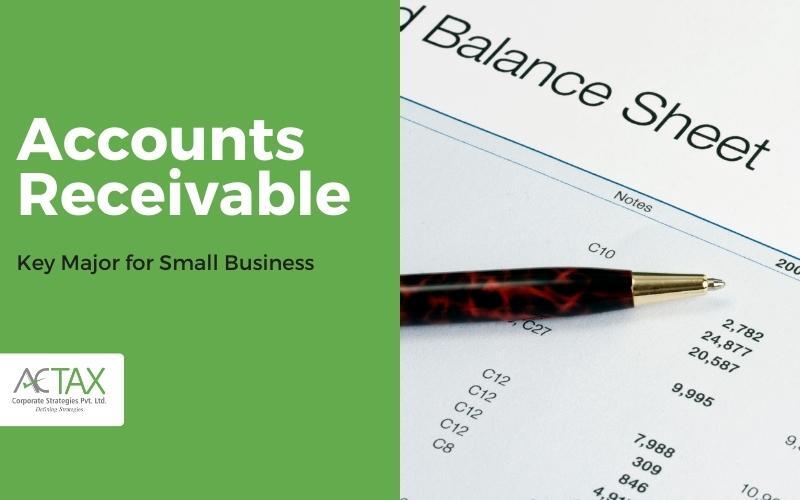
Ageing reports show you how much of your accounts receivable are overdue and how old they are so that you can follow up and take action to bring money in.
The accounts receivable ageing report is a valuable financial document that is significant for small businesses. It provides a detailed breakdown of the outstanding invoices and the timeframes within which customers are expected to pay. Here’s why this report is crucial for small businesses:
Cash Flow Management
Small businesses often depend on timely customer payments to maintain cash flow and cover operational expenses. The accounts receivable ageing report helps track outstanding receivables, allowing companies to prioritize collections and ensure a steady cash flow.
Identifying Delinquent Accounts
This report categorizes receivables by the length of time they have been outstanding. Small businesses can quickly identify delinquent accounts that require immediate attention by distinguishing between current, 30-day, 60-day, and 90-day (or more) invoices.
Collection Strategies
With the ageing report, small business owners can implement targeted collection strategies. For example, they can focus on older invoices or accounts with higher outstanding balances, increasing the likelihood of successful collections.
Cash Flow Projections
The accounts receivable ageing report aids in cash flow forecasting. By analyzing historical payment patterns, small businesses can estimate future collections and adjust their financial planning accordingly.
Bad Debt Prevention
Timely identification of overdue accounts helps prevent bad debt write-offs. Small businesses can take proactive measures, such as sending reminders or negotiating payment plans, to recover outstanding amounts before they become uncollectible.
Why Financial Documentations Are Required For Small Businesses?
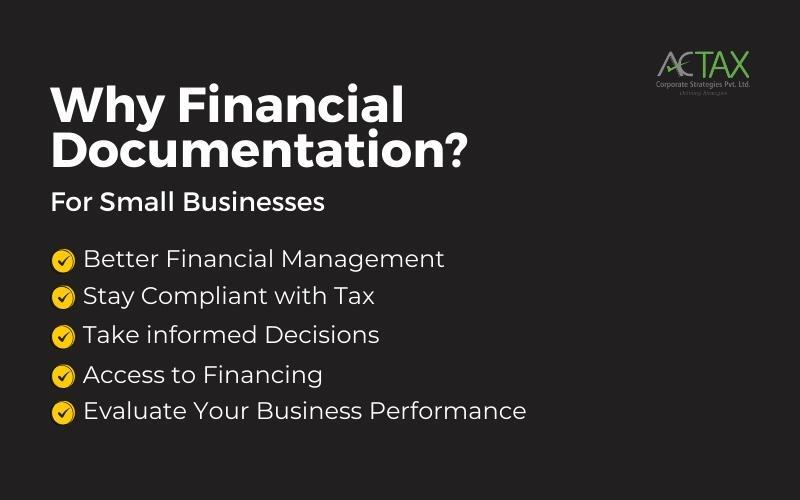
Finance documentation is essential for small businesses for several crucial reasons
1. Financial Management
Accurate finance documentation records help small business owners to manage their finances effectively. By tracking income, expenses, and cash flow, they gain insights into the financial health of their businesses.
2. Tax Compliance
Small businesses are required to file taxes regularly. Proper finance documentation for small businesses ensures compliance with tax regulations, helping them avoid penalties and legal issues.
3. Informed Decision-Making
Financial statements and reports provide data that aid in informed decision-making. Whether planning for expansion, budgeting for expenses, or assessing profitability, having the correct financial information is vital.
4. Access to Financing
When seeking loans or investments, lenders and investors rely on financial documents to evaluate a business’s creditworthiness and potential for growth.
5. Business Performance Evaluation
Comparing financial data over time helps small business owners assess their performance, identify trends, and make adjustments to improve efficiency and profitability.
Benefits Of Financial Documents Required For Small Businesses
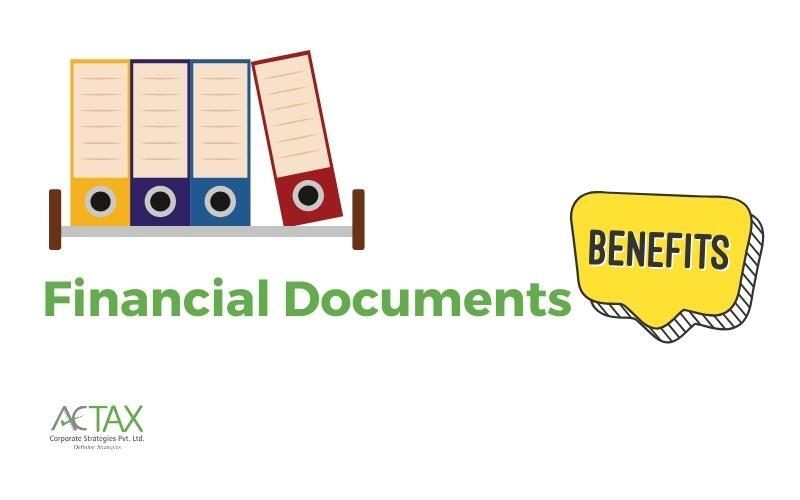
Finance documentation plays a vital role in the success and stability of small businesses. Here are four key benefits of maintaining and utilizing financial documents
1. Informed Decision-Making
Finance documentation, such as income statements, balance sheets, and cash flow statements, provide valuable insights into the financial health of a small business. Business owners can use these documents to make informed decisions regarding budgeting, investment, and growth strategies. For example, by analyzing cash flow statements, they can determine when investing in new equipment or hiring additional staff is feasible without straining cash reserves.
2. Financial Planning
Accurate finance documentation is essential for creating comprehensive financial plans. Small businesses can use historical financial data to forecast future income, expenses, and cash flow. This planning helps them set realistic financial goals, allocate resources efficiently, and identify potential challenges early on, allowing for proactive solutions.
3. Access to Financing
Finance documentation is critical when seeking loans, grants, or investments. Lenders and investors rely on these documents to assess a small business’s creditworthiness and potential for growth. Properly maintained financial records enhance a business’s credibility and increase the likelihood of securing financing at favourable terms.
4. Compliance and Tax Efficiency
Small businesses must comply with tax regulations. Financial documents, including income statements, receipts, and expense records, are essential for accurate tax reporting. Proper record-keeping can also help identify tax deductions and credits that reduce the tax burden, contributing to tax efficiency and cost savings.
Summary
In conclusion, financial documents for small businesses are not just paperwork; it is a powerful tool that enables small businesses to make informed decisions, plan for the future, secure financing, and navigate tax regulations efficiently. Small business owners should prioritize maintaining accurate and up-to-date financial records to harness these benefits and ensure the long-term success of their ventures.
